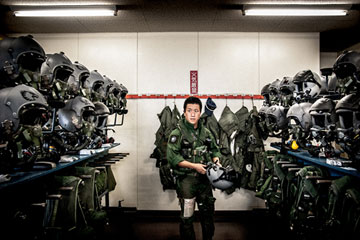
These days, Japanese pilot Kohta "Vader" Araki, who flies F-15s, is always on alert.
For a nation that technically doesn't even possess a conventional military, Japan's fighter pilots have been working overtime of late. Territorial tensions between Japan and China have intensified over a scattering of islands in the East China Sea, which Japan administers but to which China lays historic claim. From April to June, 69 Japanese jets were deployed because of perceived threats from China, compared with just 15 during the same period last year. September was just as busy, with Japan's Self- Defense Force (SDF) responding to the first confirmed flight of a Chinese drone over Japan and a flotilla of Chinese coast-guard vessels sailing through waters near the disputed islands.
Japan is still a nation divided over its martial past and future. After World War II, the country's DNA was shaped into a pacifist helix, reinforced by a constitution that renounces war altogether. Now, under hawkish Prime Minister Shinzo Abe, Japan is expanding its military footprint and speaking out more forcefully against nations it sees as threatening its sovereignty, most notably China. For Abe and other conservatives in the ruling Liberal Democratic Party (LDP), Japan's samurai spirit is just as integral to the national makeup as any paeans to peace. And a real debate is emerging about whether Japan can finally evolve into a normal country with normal armed forces.

